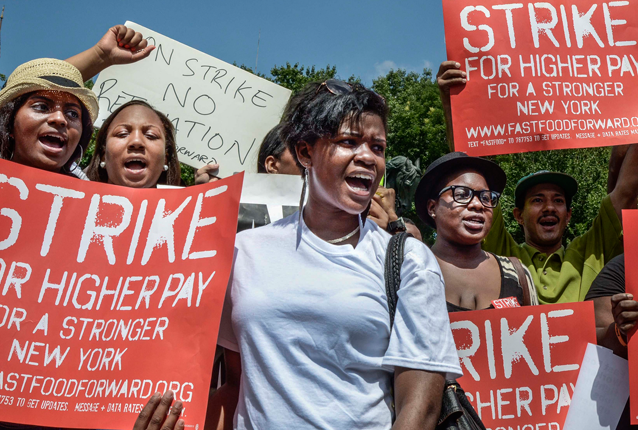Today, the New York Wage Board recommended raising the minimum wage for fast food employees to $15 an hour. The board said this increase should be implemented by 2018 in New York City and by 2021 in the rest of the state. If State Labor Commissioner Mario Musolino accepts its recommendation, nearly 180,000 New Yorkers who work in the fast-food industry will benefit from the policy.
The announcement is a clear sign that acting together and speaking up with one another for fair wages is paying off. Coming on the heels of major cities like Seattle, San Francisco and Los Angeles raising their minimum wage to $15 per hour, today’s decision by the Wage Board represents an important milestone in the national Fight for 15 movement. It was fast food workers in New York City, after all, who were the first to call for $15 nearly three years ago during their historic strike. Though it was audacious at the time, $15 has since become a rallying cry for working people across the economy, with home care aides, Walmart associates, and even adjunct professors including it among their demands.
New York is one of the few states that can enact a wage board to investigate and raise wages by industry. Governor Cuomo convened the wage board on fast food earlier this spring, shortly after an April 15th day of action that saw strikes and other actions in 200 cities across the country. The three-person board includes representatives of business (Kevin Ryan, chairman and founder of Gilt), labor (Mike Fishman, secretary-treasurer of SEIU) and the public (Byron Brown, the mayor of Buffalo).
The board members reached their decision after holding four hearings across the state, each of which drew hundreds to testify. At the Buffalo hearing, Coalition for Economic Justice led a rally of more than 500 fast food workers and allies from Western New York, while across the state at the Long Island hearing, the crowd of over 400 brought together by Long Island Jobs with Justice included strong labor and faith support. Public comment on the recommendations will be accepted for the next 45 days, after which Musolino will make the final decision.
For far too long, giant corporations like McDonald’s and Burger King have made it impossible for their employees to make ends meet, providing abysmally low wages and ignoring their collective demands for improving their workplaces with a union. The minimum wage in New York is just $8.75 an hour, far too little to raise a family in one of the most expensive states in the country. While opponents of minimum wage increases have long claimed that fast-food jobs are reserved for single teenagers who have few expenses, demographic analysis of the New York workforce proves them wrong. The average age of a fast-food employee in the state is 29 and nearly 40 percent have children. Raising the minimum wage to $15 an hour means these men and women will not have to struggle so hard to meet their families’ basic needs.
”I’m not expecting to get rich off of $15 an hour,” McDonald’s employee Amanda Monroe said. “Just the ability to survive and take care of my family.”
This announcement is big news for everyone in New York, not just fast-food employees. When fast food companies refuse to pay a living wage, employees and their families are forced to rely on public assistance just to get by. In New York, 60 percent of fast-food employees receive public assistance. A study from the Labor Center at the University of California Berkeley found that states are spending $25 billion per year on public assistance programs provided to working families. That’s $25 billion of taxpayer money subsidizing wealthy corporations that refuse to pay their employees a living wage.
“Low wages in the fast-food industry cost New York taxpayers $700 million a year,” said Rev. Kirk Laubenstein, Executive Director at the Coalition for Economic Justice. “Fifteen dollars an hour for fast-food workers will relieve New York taxpayers of a huge public assistance bill.”
Putting additional dollars into the pockets of the people employed by the fast-food giants will also stimulate our out-of-balance economy. At a press conference last month, business representative Kevin Ryan explained that raising fast-food wages will lead to increased spending and potentially job creation. As fewer taxpayer dollars are shuttled towards subsidizing giant corporations’ low wages, more consumer dollars will be poured into the economy. Most importantly, the hardworking men and women who cook our food and ring up our orders will be able to care for their families and live decent lives. Everyone wins!
The willingness of New York State to use the wage board process to raise standards for the fast food industry opens up yet another potential strategy for the Fight for $15 movement, which has seen victories already through ballot initiatives, legislation and collective bargaining. Whether the NY wage board will move on to other industries is yet to be seen, but with 35,000 homecare aides in Massachusetts set to see a raise to $15 through their latest collective bargaining agreement, and ballot measures are underway in Portland, OR and Washington, D.C., it’s clear that the national movement shows no signs of slowing down.




